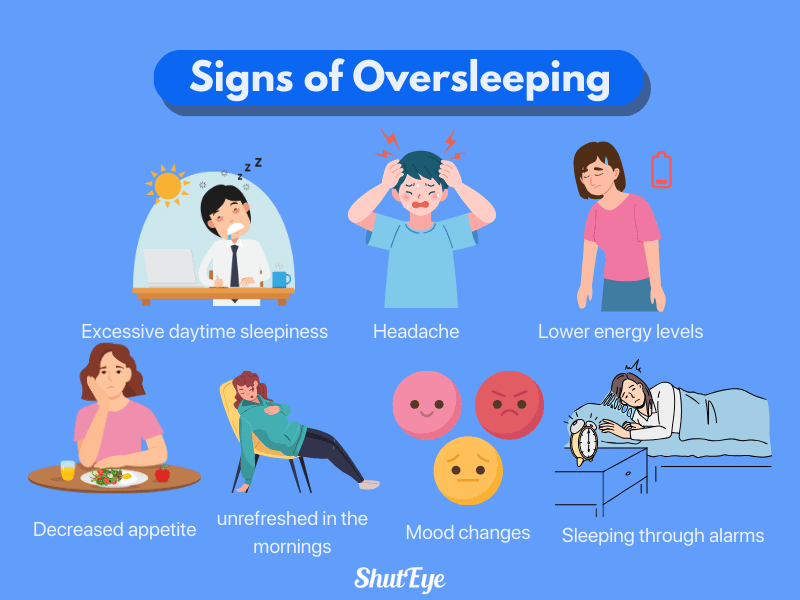


Is 9 hours of sleep too much? Is there such a thing as too much sleep? These are some of the questions that people may typically have when it comes to sleep length and its effect on our health. For many, getting at least 7 to 9 hours per night is sufficient. Any more than that may be detrimental to your health.
In this article, we will explore the causes of too much sleep, its health implications, and ways to prevent oversleeping.

The recommended amount of sleep varies for each individual, but on average, young adults need around seven to nine hours of sleep per night. Children and infants typically require more than nine hours of sleep in comparison [1].
That said, this is only a general guideline. Some people may require more sleep if they are recovering from an illness or sleep debt. It’s important to pay attention to your sleep duration and make sure you’re getting enough rest.
If you consistently find yourself sleeping more than the recommended hours per night, it may be a sign of an underlying sleep disorder or other medical conditions.
Sleeping more than nine hours per night is typically not a cause for concern if it is your general sleep needs or if you are simply recovering from sleep deprivation or a current illness. However, if this is not the case and you are regularly sleeping too much, it may indicate a possible underlying sleep or medical problem.
Some common causes of oversleeping include [2]:
Additionally, disrupted circadian rhythms, caused by shift work or jet lag, are all factors that can throw off your body’s natural sleep-wake cycle and cause long sleep durations.

Here are some signs to determine if you’re getting too much sleep:

While it may seem like getting extra shut-eye is beneficial, oversleeping is associated with various health problems.
It can lead to an increased risk of heart disease, type 2 diabetes, obesity, depression, and stroke. It is also associated with a greater risk of dying from a medical condition [2].
It’s important to understand the negative health implications and make an effort to prioritize good sleep habits. Finding the right balance is key to maintaining good health.
Feeling tired despite getting enough sleep can be attributed to various factors. One reason is sleep inertia or grogginess that occurs after waking up. This can make you feel tired even though you have had sufficient rest. Another factor is the natural afternoon dip in energy, which can contribute to feelings of fatigue.
Living out of sync with your circadian rhythm can also affect your energy levels, leaving you feeling tired. Additionally, sleep disorders, medical conditions, and medication side effects can cause excessive sleepiness, even if you have had enough sleep.
Preventing yourself from oversleeping starts with good sleep hygiene practices. Here are some ways to achieve better quality sleep and not sleep beyond what your body truly needs.
Keep to a regular sleep schedule by going to bed and waking up at the same time every day, even on the weekends. This helps you to regulate your body’s internal clock. An inconsistent sleep schedule can disrupt your circadian rhythm which may lead to insomnia and other sleep problems.

Another tip to ensure that you get an adequate amount of nighttime sleep is to limit the use of electronic devices at least 30 minutes to 1 hour before heading to bed. The screens of electronic devices emit blue light which may interfere with the production of melatonin, the hormone that helps you to fall asleep [3].

Using an alarm clock is also helpful in ensuring that you do not sleep beyond your body’s sleep requirements. Ensure you set the alarm at a time where it allows you to get at least 7 hours of rest. Make sure that it is also loud enough if you are a heavy sleeper.
You want to remember to avoid hitting the snooze button as much as you can, and remaining consistent in waking up on time.
Creating a comfortable and relaxing sleep environment can help you to achieve a better night’s rest. You want to ensure that the room is kept dark, quiet, and cool for the best sleep experience. You may also consider using sleep aids such as a sleep mask, white noise machine, or others if needed to create the right atmosphere.

Eating a healthy, balanced diet can also help to encourage a normal sleep duration. Avoid eating heavy meals before bedtime as it may lead to indigestion and disrupt your sleep. If you are feeling hungry at night, opt for lighter snacks such as a banana or yogurt.
If you feel that you are still consistently oversleeping despite making changes to your lifestyle habits, you may want to consider consulting a healthcare professional to rule out any underlying health issues such as sleep apnea or other sleep disorders.
Your healthcare provider may recommend recording your sleep habits in a sleep diary or doing a sleep study to evaluate your sleeping patterns for further treatment.
So, if you’ve been striving for a solid nine hours of sleep or more every night, it’s important to understand that oversleeping can actually have negative effects on your health. It’s crucial to maintain healthy sleep habits and find the right balance for your individual sleep needs.
Alternatively, you may also try out the ShutEye® app if you struggle with poor sleep quality. ShutEye® helps you to track your sleep cycle, offering personalized sleep tips to improve your overall sleep quality. Try it FREE for 7 days!
Harvard Health Publishing (2024) Blue light has a dark side [online]. Available at: https://www.health.harvard.edu/staying-healthy/blue-light-has-a-dark-side
John Hopkins Medicine (2025) Oversleeping: Bad for Your Health? [online]. Available at: https://www.hopkinsmedicine.org/health/wellness-and-prevention/oversleeping-bad-for-your-health
National Sleep Foundation (2020) How Much Sleep Do You Really Need? [online]. Available at: https://www.thensf.org/how-many-hours-of-sleep-do-you-really-need/